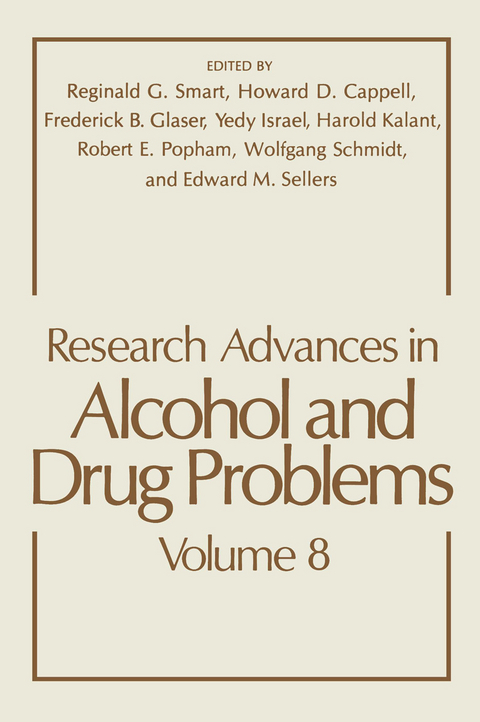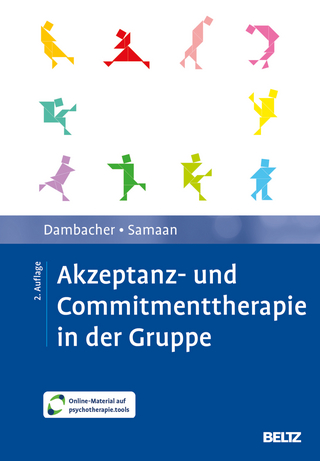
Research Advances in Alcohol and Drug Problems
Kluwer Academic/Plenum Publishers (Verlag)
978-0-306-41551-7 (ISBN)
- Titel z.Zt. nicht lieferbar
- Versandkostenfrei innerhalb Deutschlands
- Auch auf Rechnung
- Verfügbarkeit in der Filiale vor Ort prüfen
- Artikel merken
This volume is the eighth in the Research Advances Series and the fifth published by Plenum Press. The purpose of the series is to review new work in rapidly changing fields. We do not expect reviews to cover the whole field of work on alcoholism and addiction. Nor do we expect that they will be like annual reviews covering all work in a delimited field. Our reviews are designed to explore only the most exciting parts of the total field and to focus on conclusions that can be made about them. The series publishes one volume each year. Volume 8 is an omnibus rather than a theme volume in that a wide range of topics is covered, including research on alcohol, opiates, and tobacco. As usual, the greater emphasis is on alcohol research, reflecting the importance of the problem and the volume of work to be reviewed. With Volume 8 come some changes in the Editorial Board. It will be the last volume in the series for Robert E. Popham who has resigned from the Board. He has been with the series since its inception and has contributed a great deal to its development. The members of the Board are grateful for his help. We are adding two new members: Dr. Howard Cappell, whose field is experimental psychology, and Dr. Edward M. Sellers, in clinical medicine and pharmacology.
1. Opiate Tolerance and Dependence: Roles of Receptors and Endorphins.- 1. Introduction.- 2. Receptors.- 3. Effects of Chronic Opiate Treatment on Endorphin Levels.- 4. Homeostatic Regulation of Endorphin Systems.- 5. Outlook.- References.- 2. Alcohol Self-Administration by Experimental Animals.- 1. Introduction.- 2. Methods Used to Study Alcohol Intake.- 3. Factors Affecting Alcohol Intake.- 4. Animal Models of Alcoholism.- 5. Concluding Remarks.- References.- 3. Genetics of Alcoholism and Alcohol Actions.- 1. Introduction.- 2. Human Studies on Alcoholism.- 3. Animal Studies.- References.- 4. Alcohol Consumption and Ischemic Heart Disease: The Epidemiologic Evidence.- 1. Introduction.- 2. Studies of General Populations.- 3. Studies of Alcoholics and Problem Drinkers.- 4. Etiologic Significance of the Epidemiologic Findings.- 5. Conclusion.- References.- 5. Heavy Alcohol Consumption and Physical Health Problems: A Review of the Epidemiologic Evidence.- 1. Introduction.- 2. General Mortality.- 3. Hazardous Consumption Levels.- 4. Mortality by Cause.- 5. Mortality Rate Variation in General Populations.- 6. General Conclusion.- References.- 6. Assessing Alcohol Use by Patients in Treatment.- 1. Introduction.- 2. Defining Alcohol Abuse.- 3. Retrospective Methods.- 4. Self-Monitoring.- 5. Objective Methods.- 6. Recommended Strategy.- 7. Conclusion.- References.- 7. An Overview of Techniques and Problems in the Measurement of Alcohol Consumption.- 1. Introduction.- 2. The Drinking Process.- 3. Evaluation of Existing Measurement Techniques.- 4. Alcohol Consumption Measurements as Variables.- 5. Conclusion.- References.- 8. Studies of Driver Impairment and Alcohol-Related Collisions: A Methodologic Analysis.- 1. Introduction.- 2. Methodology of Studies on Driver Impairment andCollisions.- 3. Current Knowledge about Driving Impairment and Alcohol-Related Collisions.- 4. Summary and Conclusions.- References.- 9. The Contribution of Prospective Studies to the Understanding of Etiologic Factors in Alcoholism.- 1. Introduction.- 2. Preferential Recollection.- 3. Selection Bias and Enduring Myths.- 4. Elucidating “Cart and Horse” Relationships.- 5. The Problem of Evolving Symptoms.- 6. Etiology and Prognosis.- 7. Summary.- References.- 10. Treatment of Nonopiate Dependency: Issues and Outcomes.- 1. Effectiveness of Traditional Modalities.- 2. Alternative Treatment Settings.- 3. Innovative Treatment Components.- 4. Drug-Specific Treatment Strategies.- 5. Summary and Conclusions.- References.- 11. Less-Hazardous Tobacco Use as A Treatment for the “Smoking and Health” Problem.- 1. Introduction.- 2. Background.- 3. Arguments and Evidence, Not Facts and Proof.- 4. Arguments against Advocating Less-Hazardous Tobacco Use.- 5. Arguments for Advocating Less-Hazardous Tobacco Use.- 6. The Limits of Less-Hazardous Tobacco Use.- 7. Legitimizing the Topic and the Need for Research.- References.
| Reihe/Serie | Research Advances in Alcohol and Drug Problems ; 8 |
|---|---|
| Zusatzinfo | XIV, 333 p. |
| Sprache | englisch |
| Themenwelt | Geisteswissenschaften ► Psychologie ► Verhaltenstherapie |
| Medizin / Pharmazie ► Medizinische Fachgebiete ► Psychiatrie / Psychotherapie | |
| Naturwissenschaften ► Biologie ► Humanbiologie | |
| Naturwissenschaften ► Biologie ► Zoologie | |
| Naturwissenschaften ► Geowissenschaften ► Geologie | |
| ISBN-10 | 0-306-41551-8 / 0306415518 |
| ISBN-13 | 978-0-306-41551-7 / 9780306415517 |
| Zustand | Neuware |
| Informationen gemäß Produktsicherheitsverordnung (GPSR) | |
| Haben Sie eine Frage zum Produkt? |
aus dem Bereich


